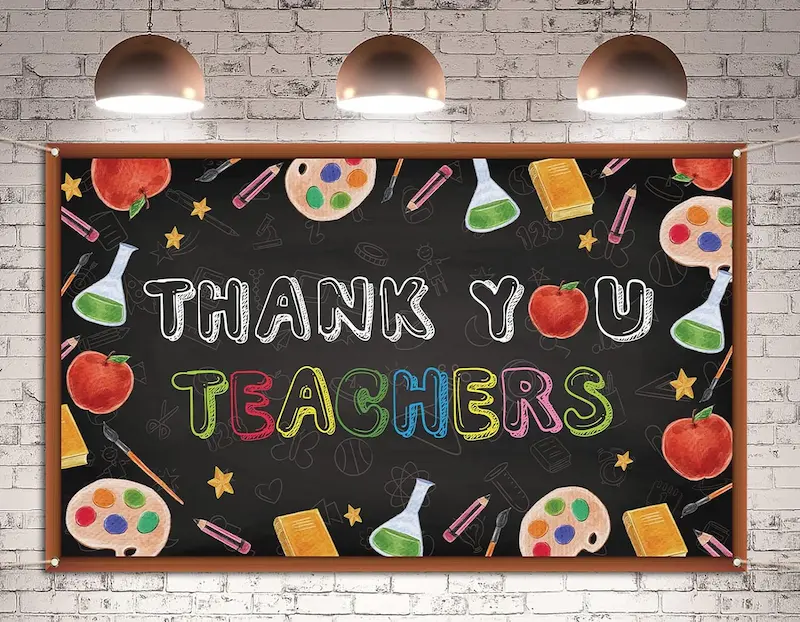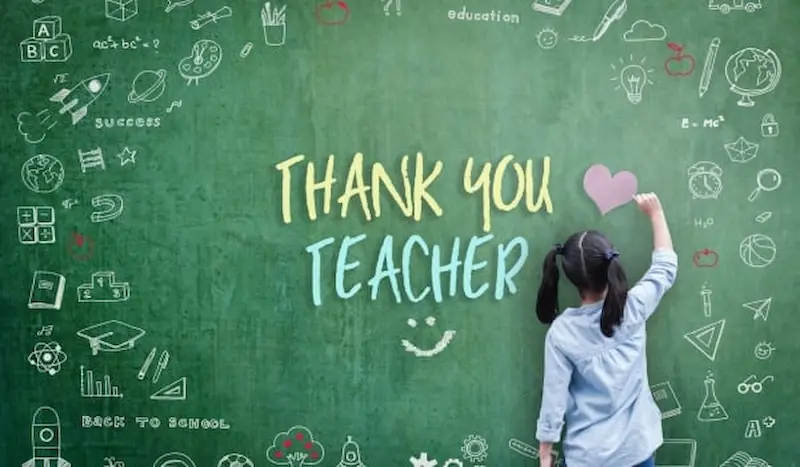Teachers form the bedrock of our society, nurturing and shaping future generations. Recognizing their tireless efforts and dedication is not just a gesture; it’s an acknowledgment of their profound impact.
Teacher Appreciation Week serves as an ideal time to honor and celebrate educators for their unwavering commitment. It’s a moment to go the extra mile and make them feel truly valued.
Table of contents
- Personalized Thank-You Notes
- Thoughtful Gifts
- Classroom Decorations
- Teacher Awards and Recognitions
- Collaborative Student Projects
- Learning Beyond the Classroom
- Wellness and Self-Care
- Community Engagement
- Professional Development Opportunities
- Teacher’s Choice Day
- Conclusion
- Frequently Asked Questions (FAQ’S)
These are the best 12 Inspirational Ideas for Teacher Appreciation Week:
Personalized Thank-You Notes
1. Handwritten Letters from Students
Encouraging students to articulate their appreciation through handwritten letters fosters not just gratitude but also improves their communication skills. These letters, expressing sincere thanks for the guidance and support received, often become cherished keepsakes for teachers, reminding them of their positive impact on young minds.
2. Heartfelt Messages from Parents
Parents, as primary stakeholders in a child’s education, hold immense influence. Encouraging them to convey their gratitude directly to teachers not only strengthens the teacher-parent relationship but also underscores the collaborative effort in a child development. These appreciative emails or notes from parents create a supportive network that boosts a teacher’s morale.
3. Virtual Appreciation Messages
In our digitally interconnected world, a video compilation of heartfelt thank-you messages serves as a touching surprise for teachers. Incorporating snippets from students, parents, and colleagues in a video montage showcases the collective admiration and gratitude towards educators, leaving a lasting impression that echoes well beyond Teacher Appreciation Week.

Thoughtful Gifts
1. Meaningful Presents for Teachers
Thoughtful gifts serve as tangible tokens of appreciation. These could range from personalized stationery items symbolizing uniqueness to a carefully chosen book that resonates with a teacher’s interests, or a gift card to their favorite coffee shop, acknowledging their need for relaxation amidst their dedicated work.
2. DIY Gift Ideas from Students
Encouraging students to engage in crafting personalized gifts instills creativity while fostering a deeper connection between the student and the teacher. Handmade gifts, such as artwork, bookmarks adorned with heartfelt messages, or gratitude jars filled with notes from each student, showcase genuine effort and appreciation.
3. Eco-Friendly Gifting Options
Embracing sustainability in gift-giving demonstrates a commitment to responsible practices. Gifting eco-friendly items, like reusable tote bags or indoor plants, aligns the gesture of appreciation with environmentally conscious values, amplifying the impact of the gift.
Classroom Decorations
1. Transforming the Learning Space
Enhancing the classroom ambiance with vibrant banners, colorful balloons, or a dedicated gratitude wall transforms the learning environment into a celebratory space. This visual representation of gratitude fosters a positive atmosphere that resonates with both teachers and students, promoting a sense of joy and appreciation.
2. Creative Classroom Makeovers
Engaging students in the redecoration process not only demonstrates appreciation but also instills a sense of ownership and pride in their learning environment. Collaboratively revamping the classroom space encourages teamwork and creativity while showcasing the collective effort in honoring teachers.
3. Themed Decoration Ideas
Themed days serve as enjoyable avenues to celebrate teachers. Hosting days such as “Dress Like Your Favorite Book Character” not only adds an element of fun but also underscores the impact teachers have in shaping students’ interests and inspirations.

Teacher Awards and Recognitions
1. Excellence Awards for Outstanding Educators
Recognizing exceptional educators with awards or certificates is more than just a formality; it’s a testament to their unwavering commitment. Such accolades not only honor individual achievements but also set benchmarks for excellence, inspiring others in the teaching community to strive for greatness.
2. Special Titles and Honors
Bestowing unique titles like “Mentor of the Year” or “Innovator in Education” adds a sense of prestige and distinction to a teacher’s career. These titles not only acknowledge their contributions but also reinforce their specialized skills and dedication, setting them apart as role models for their peers and students alike.
3. Virtual Recognition Ceremonies
Hosting virtual ceremonies to publicly acknowledge and celebrate teachers’ accomplishments allows for wider participation and inclusivity. These ceremonies serve as powerful platforms to amplify appreciation, showcasing the profound impact educators have on the community and beyond.
Collaborative Student Projects
1. Class Artwork and Crafts
Creating collaborative artwork or crafts involving all students fosters a sense of unity and camaraderie. These collective expressions of gratitude serve as visual reminders of the strong bond between teachers and their students, symbolizing appreciation and respect.
2. Creative Class Videos
Producing a video where students collectively express appreciation through skits, testimonials, or artistic presentations not only showcases their creativity but also conveys heartfelt gratitude. Such videos often become cherished mementos, reflecting the genuine admiration students hold for their teachers.
3. Surprise Collaborations
Surprising teachers with unexpected student-led projects or performances showcases the depth of appreciation within the student body. These spontaneous gestures, whether through a surprise performance or a collaborative project, reaffirm the positive impact a teacher has on their students’ lives.
Learning Beyond the Classroom
1. Field Trips and Outdoor Adventures
Organizing outdoor excursions or field trips as a gesture of appreciation provides a refreshing break from routine lessons. These experiences foster experiential learning, creating memorable moments that contribute to a holistic educational journey.
2. Inviting Guest Speakers
Arranging talks by inspirational figures or professionals from various fields introduces students to diverse perspectives. These engaging sessions not only expand knowledge but also demonstrate the value of continuous learning and curiosity.
3. Virtual Tours and Explorations
Exploring virtual tours or online experiences opens new doors for learning, catering to different learning strategies. These immersive experiences enable students to explore beyond the confines of traditional classroom settings, encouraging a thirst for knowledge.
Wellness and Self-Care
1. Stress-Relief Workshops for Teachers
Offering workshops focused on stress management and mental health underscores the school’s commitment to the well-being of its educators. These sessions provide practical tools and strategies, acknowledging the demanding nature of the profession while supporting teachers’ mental and emotional health.
2. Yoga and Meditation Sessions
Promoting wellness through activities like yoga and meditation offers teachers a rejuvenating experience. These sessions serve as avenues for relaxation, fostering a sense of balance and tranquility amid their often-hectic schedules.
Arranging a dedicated day for pampering teachers with massages, spa treatments, or self-care kits is a luxurious and heartfelt gesture. Such initiatives not only offer relaxation but also demonstrate appreciation for teachers’ hard work and dedication.
Community Engagement
1. Involving Parents and Guardians
Creating opportunities for parental involvement, such as volunteering in classrooms or school events, strengthens the bond between home and school. This collaborative approach reinforces the notion that education is a joint effort between teachers, parents, and the community.
2. Partnerships with Local Businesses
Establishing partnerships with local businesses for discounts or donations amplifies appreciation efforts. These collaborations not only showcase community support for educators but also create opportunities for mutual benefit between schools and local establishments.
3. Fundraising for Educational Causes
Initiating fundraisers for educational projects or charities in honor of teachers demonstrates communal gratitude while contributing to noble causes. Such initiatives not only recognize teachers’ efforts but also foster a culture of giving back to society.
Professional Development Opportunities
1. Training Workshops for Continued Growth
Offering workshops or courses that aid in professional development is an investment in teachers’ growth. These opportunities provide avenues for acquiring new skills and methodologies, empowering educators to continuously evolve in their teaching practices.
2. Supporting Continuing Education
Providing resources or support for teachers pursuing further education acknowledges their dedication to lifelong learning. Supporting their academic pursuits encourages a culture of continuous improvement within the educational community.
3. Networking and Conferences
Encouraging participation in conferences or networking events exposes educators to diverse perspectives and innovative practices. These interactions foster collaboration and exchange of ideas, enriching their teaching approaches and professional networks.
Teacher’s Choice Day
1. A Day of Freedom for Teachers
Granting teachers a day to design activities based on their preferences empowers them and demonstrates trust in their expertise. This allows educators to introduce unique and specialized lessons, fostering creativity and showcasing their passion for teaching.
2. Planning Special Activities by Teachers
Teachers, given the opportunity, can plan engaging and innovative activities they’ve long wished to implement. These tailor-made activities cater to students’ interests while showcasing teachers’ creativity and dedication to providing exceptional learning experiences.
3. Exploring Teacher’s Favorite Lessons
Encouraging teachers to share and teach their favorite subjects or lessons provides students with insights into their teachers’ passions. This enriches the learning experience, fostering a deeper connection between educators and students while igniting curiosity in the subjects.
Wrapping Up Teacher Appreciation Week
1. Impact on Teachers and Students
Reflecting on how these gestures positively impacted both teachers and students reinforces the importance of appreciation. It serves as a reminder of the profound influence educators have on students’ lives and their reciprocal impact on teachers.
Emphasizing the need for year-round appreciation ensures continuous support and recognition for teachers. Encouraging ongoing gestures of gratitude maintains a culture of appreciation, acknowledging educators’ tireless efforts consistently.
Conclusion
Teacher Appreciation Week is a catalyst for creating a culture of appreciation that extends beyond a single week. Recognizing and honoring the pivotal role teachers play in shaping society ensures their lasting legacy in building a brighter future.
Let’s celebrate our educators not just during Teacher Appreciation Week but every day, making their dedication and hard work a centerpiece of our collective gratitude. They are the architects of knowledge, nurturing minds and shaping the world of tomorrow.
To get your hands on more educational and free resources on coding for kids, robotics for kids, financial education for kids, etc., do check out the BrightCHAMPS Page now!
Frequently Asked Questions (FAQ’S)
A1. Teacher Appreciation Week is a dedicated time to honor and recognize the invaluable contributions of educators, teachers, professors, and mentors in shaping the lives of students. It’s a week-long observance to express gratitude and appreciation for their hard work, dedication, and impact on education.
A2. Celebrating Teacher Appreciation Week is crucial as it acknowledges the tireless efforts and significant role teachers play in society. It boosts morale, recognizes their contributions, and motivates educators to continue positively impacting the lives of students.
A3. The origins of Teacher Appreciation Week date back to the 1940s when Eleanor Roosevelt persuaded Congress to set aside a day to recognize teachers. In 1984, the National Parent Teacher Association (PTA) established the first full week of May as Teacher Appreciation Week.
A4. Yes, Teacher Appreciation Week celebrations can be conducted virtually. With the rise of online platforms and communication tools, expressing gratitude through video messages, virtual cards, emails, and social media tributes has become increasingly popular and effective.
A5. Write heartfelt thank-you notes or letters expressing appreciation.
Organize a virtual talent show or showcase where students display their talents dedicated to their teachers.
Create a gratitude video compilation featuring students’ messages of thanks.
Host a virtual themed day, such as a “Teacher Appreciation Spirit Day,” where everyone dresses up in a specific theme to honor teachers.
Arrange a virtual group activity, like a quiz or game night, where teachers and students can participate together online.


 We are an army of educators and passionate learners from BrightChamps family, committed to providing free learning resources to kids, parents & students.
We are an army of educators and passionate learners from BrightChamps family, committed to providing free learning resources to kids, parents & students.








